Scott Taylor was the release lead for WordPress 4.4. He outlined several goals for the release, including closing many tickets, front-loading development, and finding out what could realistically be accomplished with limited resources. Some of the major features included in 4.4 were the REST API, responsive images, comments overhaul, and Twenty Sixteen theme. Taylor discussed lessons learned, like the high burnout rate among volunteers and the significant technical debt in WordPress. He presented case studies on refactoring PHP code structure and improving performance of AJAX unit tests. Taylor argued for moving away from globals and treating WordPress as one part of a larger system, and drew inspiration from practices like PSR standards, Composer,


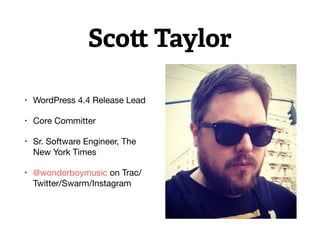


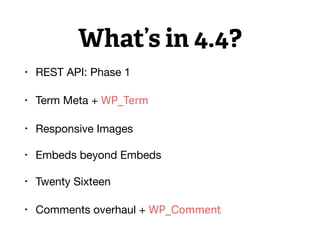

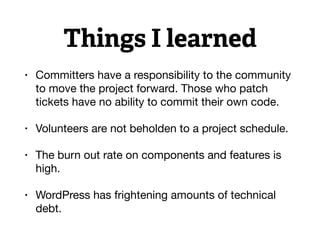







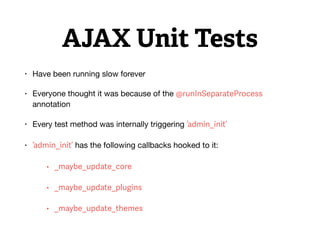












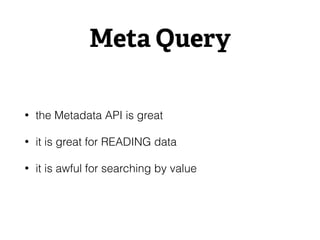


![{
"repositories":[
{
"type":"composer",
"url":"http://wpackagist.org"
},
{
"type": "vcs",
"url": "https://github.com/newsdev/nyt-wp-media.git"
},
{
"type": "vcs",
"url": "https://github.com/newsdev/nyt-wp-bylines.git"
}
],
"require": {
"guzzlehttp/guzzle": "~6.0",
"mustache/mustache": "~2.5",
"symfony/http-foundation": "~2.7",
"monolog/monolog": "~1.14",
"wpackagist-plugin/akismet": "~3.1",
"wpackagist-plugin/amazon-s3-and-cloudfront": "~0.9",
"wpackagist-plugin/amazon-web-services": "~0.3",
"wpackagist-plugin/rewrite-rules-inspector": "~1.2",
"wpackagist-plugin/debug-bar": "0.8.*",
"wpackagist-plugin/debug-bar-console": "0.3.*",
"newsdev/nyt-wp-media": "dev-master",
"newsdev/nyt-wp-bylines": "dev-master"
},
"prefer-stable": true,
"autoload": {
"psr-4": {
"NYT" : "lib/php",
"NYTShell": "wp-content/themes/shell/php"
}
}
}](https://image.slidesharecdn.com/wordcampnyc2015-151031181350-lva1-app6892/85/WordPress-4-4-and-Beyond-32-320.jpg)
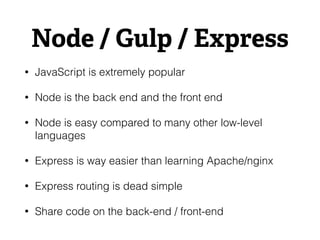
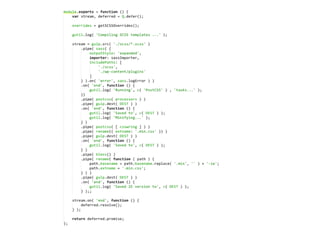
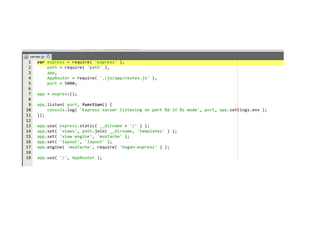
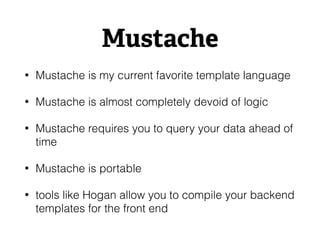
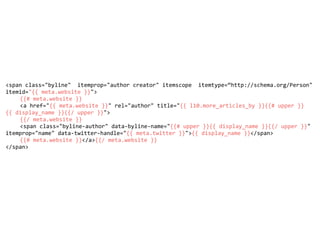
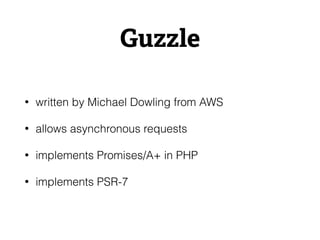
![<?php
namespace NYTHttp;
use GuzzleHttpPromise;
trait Client {
protected $client;
protected $promises = [];
public function setConfig( $config = [] ) {
$this->client = new GuzzleHttpClient( $config );
}
public function add( $key, $request ) {
$this->promises[ $key ] = $request;
}
public function send() {
$results = Promiseunwrap( $this->promises );
$responses = [];
foreach ( $results as $key => $response ) {
$responses[ $key ] = [
'status' => $response->getStatusCode(),
'headers' => $response->getHeaders(),
// convert PsrHttpMessageStreamInterface to string
'body' => (string) $response->getBody(),
];
if ( in_array( 'application/json', $response->getHeader( 'Content-Type' ) ) )
{
$responses[ $key ]['body'] = json_decode( $responses[ $key ]['body'],
true );
}
}
// clear the queue
$this->promises = [];
return $responses;
}
}](https://image.slidesharecdn.com/wordcampnyc2015-151031181350-lva1-app6892/85/WordPress-4-4-and-Beyond-39-320.jpg)
